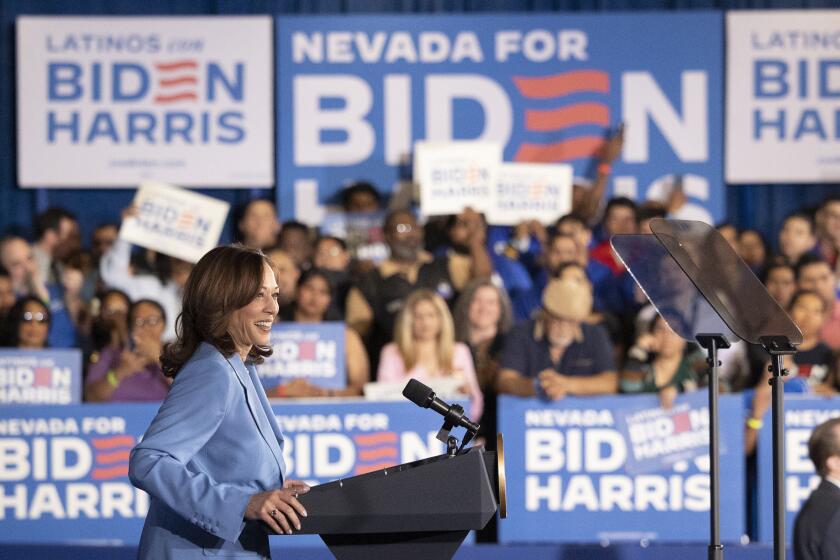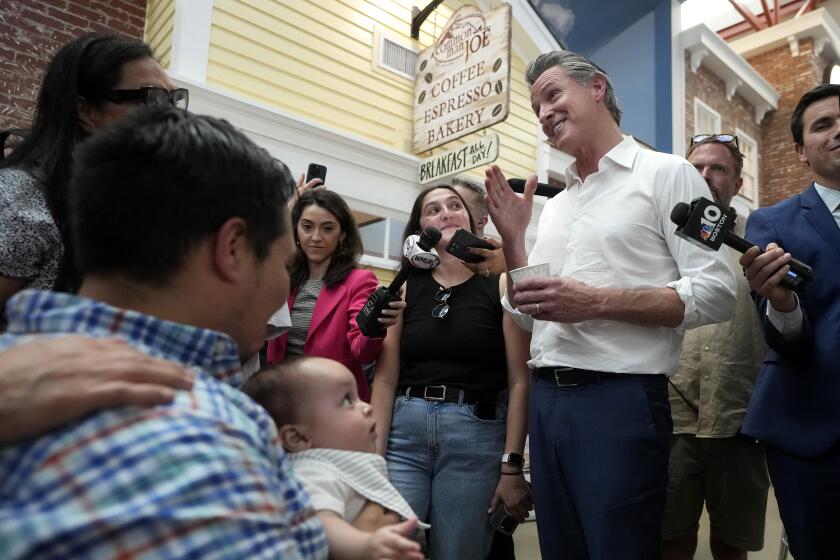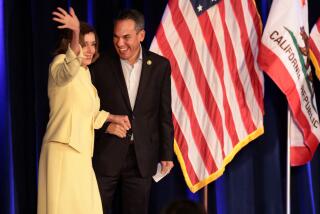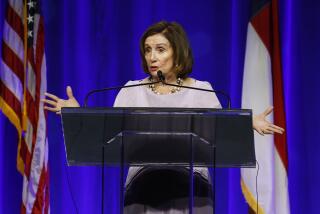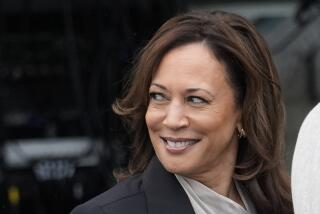Amid confusion among Democrats, Pelosi sends a loud message: ‘Time is running short’

Americans experiencing whiplash over Democratic leaders’ desire to nudge President Biden out of his reelection campaign can be forgiven.
Just as it seemed Biden had beaten back congressional pressure to withdraw this week, former Speaker Nancy Pelosi of San Francisco ushered in another wave of doubt Wednesday, warning Biden that “time is running short” to reconsider a decision he has said repeatedly and defiantly that he has already made.
The party has contorted itself over the last two weeks as it contends with competing forces: Biden’s pride; the party’s sinking poll numbers; fear of chaos; elected lawmakers’ personal ambitions and the overwhelming anxiety among Democrats of all stripes that former President Trump will win a second term.
Democratic lawmakers have tried all manner of responses to their Biden dilemma — some evasive, some creative.
The Tuesday walkback from Rep. Jerrold Nadler of New York, who had called for a new candidate only two days earlier: “Whether I have concerns or not is beside the point.”
The Wednesday double-reverse by Rep. Ritchie Torres of New York, who on Monday warned that the “drip-drip-drip” of public calls for Biden’s withdrawal were wounding him: “An unsentimental analysis of the cold hard numbers — which have no personal feelings or political loyalties — should inform what we decide and whom we nominate.”
The restatement of fact from Rep. Ro Khanna of Fremont during a Washington Post video interview: “The reality is that the president has said that he is running.”
The optimistic quip from Rep. Lou Correa of Santa Ana: “80 is the new 60.”
A predicted tsunami of Capitol Hill Democrats calling for President Biden to withdraw from his reelection bid has instead given way to isolated flash floods of public dissent, held back by a thin seawall of support. Many lawmakers have dodged reporters, talked around the question or, when pressed, said what they needed to say in hopes of moving on from concerns about Biden’s decline or whether he is capable of defeating Trump.
They have largely left such calls to donors and other influential unelected leaders. George Clooney, who co-hosted a Hollywood mega-fundraiser for Biden last month, penned a brutal call for his withdrawal in a Wednesday op-ed in the New York Times.
“The one battle he cannot win is the fight against time,” Clooney wrote. “None of us can. It’s devastating to say it, but the Joe Biden I was with three weeks ago at the fundraiser was not the Joe ‘big F— deal’ Biden of 2010. He wasn’t even the Joe Biden of 2020. He was the same man we all witnessed at the debate.”
Pelosi, one of the most influential voices in Biden’s sphere outside of his family, seemed to sense that Biden’s efforts to stall for time were nonetheless pushing the party toward acceptance of a candidacy that is looking increasingly doomed, as polls and political handicappers push the needle toward Trump.
The respected Cook Political Report shifted six states toward Trump’s column late Tuesday, including Arizona and Nevada, which it moved from the “toss-up” category to “Lean R,” presaging the possibility that the election moves from squeaker to landslide.
Pelosi said in her Wednesday appearance on MSNBC’s “Morning Joe,” Biden’s favorite cable news show, that she preferred to keep the discussions behind closed doors — for now.
Since President Biden’s debate performance, Vice President Kamala Harris has received more attention than at any time since her early, rocky days as his No. 2.
“Tell somebody privately, but you don’t have to put that out on the table until we see how we go this week,” she said.
But by appearing on the same show where Biden declared angrily on Monday that he would remain in the race — and then ignoring his declaration — she sent a very pointed signal.
“It’s up to the president to decide if he is going to run,” she said. “We’re all encouraging him to make that decision because time is running short.”
Pelosi sandwiched her comments between praise for Biden and his record. But Pelosi is notably careful and calculating in her public comments. She is no longer in Democratic leadership but remains in the House after one of the most consequential tenures in history.
At 84, she is three years older than Biden and served alongside him for most of his political career, working closely with him during the Obama presidency to pass the Affordable Care Act. She also had the experience of watching close friend Sen. Dianne Feinstein deteriorate before dying in office last year.
Former President Obama, another influential voice, has been quiet since offering initial support. He believes he can be most valuable as a “sounding board and confidant” to Biden, according to a person who speaks with him regularly and requested anonymity to discuss the closed-door relationship.
The reluctance of most lawmakers to step out on their own says as much about their political motivations — and the imperative politicians place on self-preservation — as it does about Biden. Polls show majorities of voters want Biden to step aside and he has fallen further behind Trump in many head-to-head polls, including an AARP poll released Tuesday that showed him five percentage points down in Wisconsin, a must-win state.
“It’s driven by caution, political survival instincts. A lot of Democrats don’t want to be out on a limb,” said Tim Miller, who worked on communications strategy at the highest levels of Republican politics before becoming a vocal Trump critic and leaving the party.
“There’s a lot of loud voices that are going to yell at you on social media and the phones in your office,” he added, arguing that those voices do not represent the consensus among voters.
Behind the scenes, elected Democrats are deeply worried about Biden’s declining stamina and his ability to defeat Trump, according to congressional aides and others who have spoken with them, along with public comments of some lawmakers. The mood at a meeting of House Democrats on Tuesday at the Democratic National Committee’s headquarters was described as “sad and frustrated” by a person familiar with the closed-door meeting who would only describe it anonymously. Senate Democrats held a similar gathering later in the day.
But for now, at least, Biden appears to have avoided the kind of mass public defections that would force his hand. He could face a new round of doubts if fresh polls show him sinking further or he stumbles during a public event like his planned news conference on Thursday. But the longer he buys time, the less likely it is he will leave the race.
Vice President Kamala Harris and California Gov. Gavin Newsom are on the road supporting President Biden in the aftermath of last week’s debate.
Rep. Alexandria Ocasio-Cortez, the New York Democrat and leading progressive voice, appeared to be reckoning with that reality late Monday as she tried to close the book with yet another sort of semi-endorsement that evaded the question of whether he should remain in the race. “Joe Biden is our nominee. He is not leaving this race,” she told reporters. “He is in this race and I support him.”
Jim Manley, who spent decades in the Senate devising communication strategies for Democratic leaders, said the reactions have surprised him, especially the unwillingness of many House Democrats to speak out when they normally rush for the cameras.
“The president feels correctly that time is his friend. Many members are unwilling to confront this. They’re just stalling for time,” he said.
But there’s also a problem of collective action. Lawmakers such as Nadler and Sen. Mark R. Warner of Virginia stepped back from their calls for a new candidate after they failed to rally others.
“The president has probably benefited from the lack of a really organized opposition,” said John Lawrence, who spent 38 years as a Democratic aide, eight of them as Pelosi’s chief of staff.
But it’s also not the nature of members of Congress, who tend to value their own reelection more than the presidency or even which party controls the House and Senate, said Lawrence, author of “Arc of Power: Inside Nancy Pelosi’s Speakership, 2005-2010.” Going against an incumbent president, stirring chaos at the top of the ticket or shaking up an institution all cut against those goals, he said.
“Relatively few revolutions are launched by people in power,” he said.
Republicans have been tested by Trump many more times than Democrats as their nominee has faced two impeachments, multiple indictments, a conviction, calls to suspend the Constitution and any number of startling statements that began before he became president in 2017.
“I don’t want to compare thoughts about a candidate’s age to not wanting to speak out about a candidate’s racism or bigotry or lies or conspiracy mongering,” Miller said. “The motivations come from the same place, which is political survival and not wanting to rock the boat.”
Times staff writers Seema Mehta and Faith Pinho contributed to this report.
More to Read
Get the L.A. Times Politics newsletter
Deeply reported insights into legislation, politics and policy from Sacramento, Washington and beyond. In your inbox three times per week.
You may occasionally receive promotional content from the Los Angeles Times.

